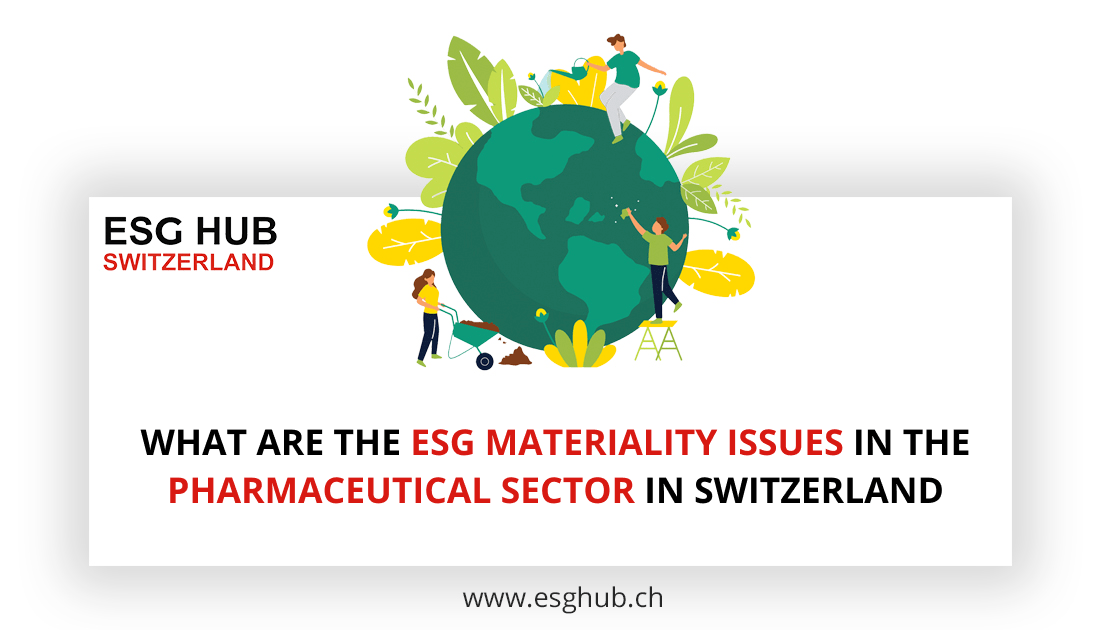What are the ESG materiality issues in the pharmaceutical sector in Switzerland?
What are the ESG materiality issues in the pharmaceutical sector in Switzerland?

“The pharmaceutical sector in Switzerland is a major industry, accounting for approximately 7% of GDP, and 35% of manufacturing.”
The Swiss pharma business is the largest pharma business in Europe. Whether you are discussing the production value, R&D expenditure, or innovation in healthcare technologies, Swiss pharmaceutical companies are always on top. Despite this, corruption scandals, product safety, and opaque business operations have led to the erosion of trust in this industry in recent years.
Since the outbreak of the Covid 19 pandemic, however, the Swiss pharmaceutical industry has proven to be resilient and adaptable in the face of unprecedented challenges. The industry’s rapid development and distribution of vaccines, as well as the capacity and agility of its supply chains, has demonstrated its ability to respond to such adversity.
Now is the time to concentrate on the long-term sustainability of the industry.
The pharmaceutical industry focuses on mitigating and managing risks that are increasingly tied to environmental, social, and governance (ESG) issues.
1. Access to healthcare
We observed during the pandemic that the issue of access to vaccines was a critical component of sustainability from social and economic points of view.
The Covid-19 pandemic has highlighted the importance of affordable, timely, equitable, and universal healthcare. Despite the fact that Covid-19 vaccines were developed at an unprecedented rate, millions of people did not have access to life-saving vaccines.
It should be ensured that vaccines and medicines must not only be manufactured and distributed but also accessible to all. This is arguably the most important materiality issue in the sector.
2. Responsible supply chain management
Pharmaceutical supply chains are truly global. Companies often supply critical materials from a single region or nation. For example, China supplies 96% of the chloramphenicol sold in the European Union. Switzerland is not an exception. However, this puts pharma industries at risk of running out of supplies amid a pandemic, natural disasters, or geopolitical tensions.
Pharma companies in Switzerland can reduce their exposure to supply chain risks by diversifying their source of origin. They can also choose between domestic production, or they can shift to strategically differentiated locations for the optimal management of supplies.
3. Ethical business practices
The pharmaceutical industry also faces questions in relation to ethical practices. Should the pharma industry be held to a higher standard than other industries? How do they reconcile their perspectives on profit while also providing life-saving drugs? Do pharmaceutical companies have a moral obligation to invest in research and development?
4. Climate change and energy
Climate change can have an impact on almost every point in a supply chain, from raw material sourcing to end-product distribution, posing a variety of short- and long-term risks. Adverse weather events, storms, and rising temperatures can result in raw material supply delays, unplanned production downtime, transportation delays, and cold chain storage breakdowns.
5. Safe and appropriate use of products
Product safety is another important materiality issue that must be addressed during the drug development process. When conducting drug development, the product’s safety profile must be properly evaluated
6. Value-based pricing
Regulations and the market create demand for lower healthcare costs while maintaining safety and quality. It is only a matter of time before pharma firms will have to offer medicines that show real, quantifiable value to stakeholders in a new, value-driven healthcare system. Value-based pricing, which aligns the incentives of consumers and manufacturers, is consequently receiving more attention.
7. Responsible R&D
The role of the R&D department is critical when it comes to developing new medicines, as well as process refinement and improvement. Other departments, such as sales and marketing, maybe more outwardly focused, but in the pharma industry, the role of R&D is distinct. R&D is the reason we have so many wonderful health products that save and prolong lives.
Conclusion
In the pharmaceutical industry, integrating ESG can address many pressing challenges and allow organizations to grow in a reputable, profitable, and sustainable manner in the long term.
Many major pharmaceutical companies are incorporating ESG into their operations. The sector as a whole should also commit to more ambitious international commitments in relation to access to medication.
We are happy to assist you at any stage of your organization’s sustainability journey. For more information, please contact us.